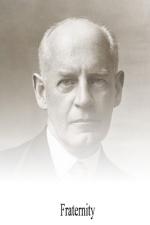No mention of the little model....
The old butler dwelt on this reticence of Mrs. Hughs, when, two hours afterwards, in pursuance of his instinctive reliance on the gentry, he called on Hilary.
The latter, surrounded by books and papers—for, since his dismissal of the girl, he had worked with great activity—was partaking of lunch, served to him in his study on a tray.
“There’s an old gentleman to see you, sir; he says you know him; his name is Creed.”
“Show him in,” said Hilary.
Appearing suddenly from behind the servant in the doorway, the old butler came in at a stealthy amble; he looked round, and, seeing a chair, placed his hat beneath it, then advanced, with nose and spectacles upturned, to Hilary. Catching sight of the tray, he stopped, checked in an evident desire to communicate his soul.
“Oh dear,” he said, “I’m intrudin’ on your luncheon. I can wait; I’ll go and sit in the passage.”
Hilary, however, shook his hand, faded now to skin and bone, and motioned him to a chair.
He sat down on the edge of it, and again said:
“I’m intrudin’ on yer.”
“Not at all. Is there anything I can do?”
Creed took off his spectacles, wiped them to help himself to see more clearly what he had to say, and put them on again.
“It’s a-concerning of these domestic matters,” he said. “I come up to tell yer, knowing as you’re interested in this family.”
“Well,” said Hilary. “What has happened?”
“It’s along of the young girl’s having left them, as you may know.”
“Ah!”
“It’s brought things to a crisax,” explained Creed.
“Indeed, how’s that?”
The old butler related the facts of the assault. “I took ’is bayonet away from him,” he ended; “he didn’t frighten me.”
“Is he out of his mind?” asked Hilary.
“I’ve no conscience of it,” replied Creed. “His wife, she’s gone the wrong way to work with him, in my opinion, but that’s particular to women. She’s a-goaded of him respecting a certain party. I don’t say but what that young girl’s no better than what she ought to be; look at her profession, and her a country girl, too! She must be what she oughtn’t to. But he ain’t the sort o’ man you can treat like that. You can’t get thorns from figs; you can’t expect it from the lower orders. They only give him a month, considerin’ of him bein’ wounded in the war. It’d been more if they’d a-known he was a-hankerin’ after that young girl—a married man like him; don’t ye think so, sir?”




